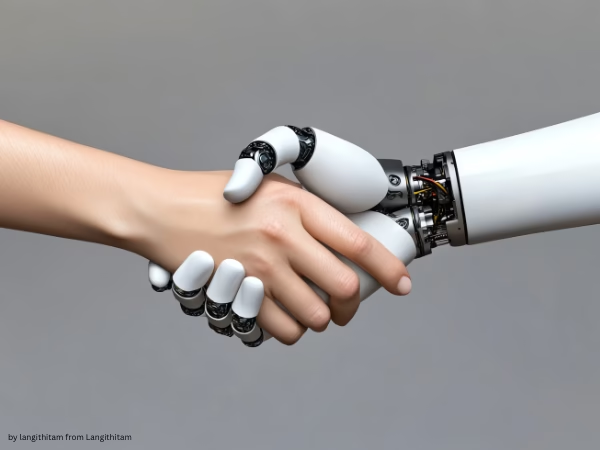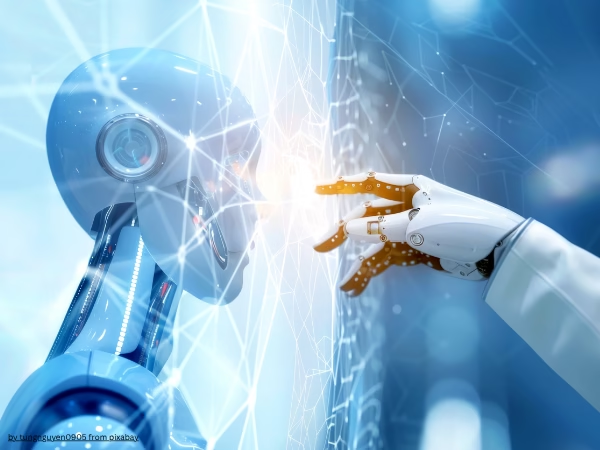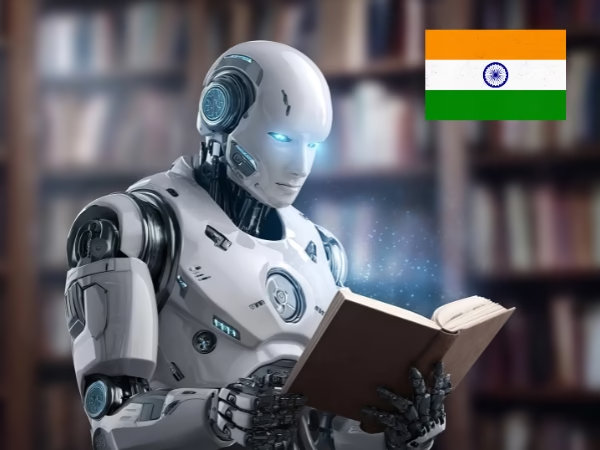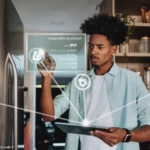The key difference between artificial intelligence and human intelligence is that AI processes data logically, while human intelligence includes emotion, creativity, and consciousness. AI learns patterns from data, but humans think, feel, and adapt beyond logic.
Let’s Start with a Fun Thought
Imagine an AI robot reading Shakespeare, it can tell you every word’s meaning, rhyme, and structure.
But can it feel heartbreak like a human reading “Romeo and Juliet”?
That’s the core difference between AI and human intelligence.
AI imitates; humans imagine.
AI computes; humans create.
And that’s what makes this topic, the difference between human and artificial intelligence — so fascinating.
Understanding the Basics
Before we go deep, let’s clarify what we mean by intelligence in both contexts.
| Type | Meaning | Example |
|---|---|---|
| Artificial Intelligence (AI) | Machine ability to perform tasks that require human-like thinking. | ChatGPT answering questions or Tesla’s self-driving mode. |
| Human Intelligence (HI) | Natural ability of humans to think, reason, and adapt emotionally and socially. | A doctor diagnosing a patient with intuition and empathy. |
So while both process information, one learns through algorithms, and the other through experience and consciousness.
What Is Artificial Intelligence, Really?
Artificial intelligence (AI) refers to the simulation of human-like intelligence in machines, systems that can analyze, learn, reason, and make decisions.
AI tools like ChatGPT, Gemini, and self-driving cars use machine learning, neural networks, and deep learning to mimic how humans think.
AI’s main purpose:
To automate human tasks and improve efficiency.
Examples:
- AI predicting stock trends.
- Voice assistants like Alexa understanding commands.
- Google Maps suggesting traffic-free routes.
This topic often appears in artificial intelligence group discussion and GD topics on artificial intelligence, because it shows how AI changes the way we work and think.
Read this also AI Courses After 12th: Complete Guide for Students
What Is Human Intelligence?
Human intelligence is our natural cognitive power, the ability to think, learn, feel, and adapt based on experience and emotion.
Humans don’t just process data, we reflect, dream, and empathize.
Example:
A chef may use logic to follow a recipe, but intuition to add a pinch of spice that transforms the dish.
That’s intelligence beyond programming.
Humans can:
- Handle unexpected challenges.
- Understand emotional context.
- Learn from very few examples.
AI, on the other hand, needs tons of data to learn what humans grasp intuitively.
Main Difference Between Artificial Intelligence and Human Intelligence
Let’s break this down simply.
| Aspect | Artificial Intelligence (AI) | Human Intelligence (HI) |
|---|---|---|
| Origin | Created by humans through programming and data. | Natural and biologically evolved. |
| Learning method | Learns from data and patterns. | Learns from experience, emotion, and reasoning. |
| Adaptability | Limited to what it is trained on. | Highly adaptable in new or uncertain situations. |
| Decision making | Logical, data-driven. | Emotional and situational. |
| Creativity | Mimics creativity but lacks originality. | Driven by imagination and emotions. |
| Speed and accuracy | Very fast, highly accurate in repetitive tasks. | Slower but capable of deeper insight. |
| Ethics and empathy | No sense of morality or empathy. | Guided by values, culture, and emotions. |
| Memory | Perfect recall of stored data. | Limited, selective, but contextual. |
So, when people ask for a difference between AI and HI, this is what they mean:
AI is smart but mechanical. HI is thoughtful, emotional, and human.
Fun Fact Corner
- AI can beat humans in chess, but humans invented chess.
- AI never gets tired, but it also never dreams.
- Human brains can rewire themselves, but AI models must be retrained.
- AI once wrote music in Beethoven’s style, but it didn’t feel the rhythm.
Applications of Artificial Intelligence vs Human Intelligence
Both have roles; one excels in efficiency, the other in empathy.
AI Applications
- Healthcare: Predicting diseases, analyzing scans, robotic surgeries.
- Finance: Fraud detection, algorithmic trading.
- Retail: Personalized recommendations.
- Transportation: Self-driving cars.
- Education: Smart tutors and automated grading.
Human Intelligence Applications
- Counseling: Understanding emotional cues.
- Leadership: Decision-making under moral or social complexity.
- Art and creativity: Painting, writing, composing.
- Crisis management: Handling new situations dynamically.
- Parenting: Empathy-driven guidance, not logic-based control.
This is where we see the difference between human and machine intelligence; AI can support, but not replace the human factor.
Can Artificial Intelligence Replace Human Intelligence? (Group Discussion Perspective)
This is one of the most popular GD topics on artificial intelligence: “Can AI replace human intelligence?”
Here’s how you can structure it if this comes up in a group discussion on artificial intelligence or an artificial intelligence GD:
Points For:
- AI is faster and more efficient.
- It reduces human error.
- It can process huge amounts of data.
- AI automates repetitive and dangerous tasks.
Points Against:
- AI lacks emotional intelligence.
- It cannot handle moral dilemmas.
- Creativity and ethics belong to humans.
- Dependency on AI can limit human innovation.
Balanced View:
In a GD on artificial intelligence, it’s smart to say AI complements human intelligence rather than replacing it.
Humans create AI, teach it, and control its limits, so AI can assist, not exist without humans.
This makes it a great artificial intelligence group discussion example topic, especially when asked “Is artificial intelligence a boon or bane?”
Artificial Intelligence: Boon or Bane, Group Discussion Insight
Boon (Advantages):
- Increases productivity.
- Improves accuracy in complex data-driven jobs.
- Helps in science, medicine, and space.
- Makes daily life easier (maps, voice assistants, etc.).
Bane (Disadvantages):
- May reduce some jobs.
- Lacks human emotion and empathy.
- Risk of over-dependence and misuse.
- Raises ethical concerns in privacy and bias.
In any artificial intelligence boon or bane group discussion, emphasize that AI is a tool.
It’s neither good nor bad, it depends on how we use it.
Difference Between Artificial Intelligence and Natural Intelligence
This phrase: difference between artificial intelligence and natural intelligence, often confuses people.
“Natural intelligence” refers to the cognitive ability found in living beings (humans, animals, even some birds).
Artificial intelligence is what machines learn through algorithms.
Example:
A dog recognizes its owner by smell and natural intelligence.
A face-recognition camera detects the owner visually, using artificial intelligence.
Limits of AI Compared to Humans
Even though AI is advancing rapidly, it still has limits compared to humans.
- Lack of emotion: AI can simulate empathy but doesn’t feel it.
- Limited creativity: AI creates based on existing data, not pure imagination.
- Dependency: AI depends on power, data, and algorithms.
- Moral blindness: It doesn’t understand right from wrong, only logic.
- Context blindness: Humans can sense sarcasm or irony; AI often cannot.
Humans have instincts and intuition that go beyond calculation.
That’s the ultimate difference between AI and human intelligence.
The Connection: When AI and Humans Work Together
Instead of competition, collaboration is the future.
AI handles speed; humans handle sense.
Example:
In medicine, AI scans X-rays faster, but a doctor interprets results using empathy and experience.
That’s how AI and HI complement each other.
When used wisely, AI amplifies human capability.
That’s why in artificial intelligence GD topics, you’ll often hear the phrase:
“AI will not replace humans, but humans using AI will replace those who don’t.”
Future Outlook
AI will keep evolving, but it still needs human supervision.
Ethical design, emotional intelligence, and creative insight will remain human strengths.
New fields like Human-AI collaboration, Explainable AI, and Ethical AI are shaping how machines and people can work together responsibly.
In the future, understanding the difference between intelligence and artificial intelligence will help us maintain balance, not lose it.
Final Thoughts
To sum it up:
- AI is logical, human intelligence is emotional.
- AI is programmed; humans are inspired.
- AI learns patterns; humans create them.
We may one day have AI systems that think like us, but until they can feel, the difference between human and artificial intelligence will always remain clear.
AI is powerful, but humanity is priceless.
FAQs
1. What is the main difference between artificial intelligence and human intelligence?
AI learns from data and performs logical tasks, while human intelligence involves emotional understanding, creativity, and adaptability.
2. Can artificial intelligence replace human intelligence?
No, AI can assist but not replace humans. It lacks consciousness, emotions, and moral judgment.
3. What are the pros and cons of AI in daily life?
Pros include automation, speed, and accuracy. Cons include job risk, dependency, and lack of empathy.
4. Why is this topic popular in group discussions?
Because “difference between AI and human intelligence” leads to debates on technology, jobs, ethics, and the future of humanity. It’s a favorite artificial intelligence GD topic.









[…] Read this also Difference Between Artificial Intelligence and Human Intelligence […]